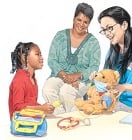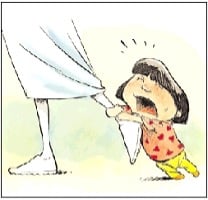After hospitalization

When your child comes home from the hospital, you may feel that things will get back to normal. This may not be the case. A child’s behavior may regress because of their stay in the hospital. You may notice these changes in different ways. Being separated from you or other family members – even for short periods of time – may be stressful for your child.
What causes the changes?
Your child may have been used to the hospital routine. They may have had extra attention and support from family and medical staff. Tests or procedures may have been a big part of their hospital stay. The hospital environment is different from home, where there are family rules and routines to follow. It may take time for your child to fit back into their role within the family unit.
Other behavior changes may happen because your child:
- Does not understand why they were in the hospital.
- Is angry or upset with you, the doctors or nurses. This is common, since many children do not start to show their anger until they get back home.
- May be afraid that they will need to go back to the hospital again.
What are the changes that may happen?

Your child may need more of you or your family’s time. Your child may need help with things they did on their own before the hospital stay. Your child may also:
- Change how they eat.
- Have a setback in toilet training.
- Change their sleeping patterns. It may be hard to go to sleep or they may ask to sleep with you, etc.
- Have temper tantrums.
- Go back to early behaviors such as thumb-sucking to provide comfort.
How can I help my child get through the changes?
Be patient and consistent. This will help your child adjust to being back home.
- Give your child extra love and attention.
- Stick to normal home routines.
- Reassure your child that when you leave, you will return.
- Help your child express feelings by talking about their stay in the hospital.
- Let your child play doctor or nurse. Pretend that a favorite doll or stuffed animal is the patient.
- Have your child draw or paint pictures about the hospital.
- Toys such as a pounding toy, clay or a pillow to punch may help your child if they are feeling frustrated or angry.
Remember that changes are normal. Changes in behavior are one way children express their feelings. With patience and help, your child can return to a regular routine. If these behavior changes continue for a long time, talk to your child’s healthcare provider. This sheet was created to help you care for your child or family member. It does not take the place of medical care. Talk with your healthcare provider for diagnosis, treatment and follow-up.



